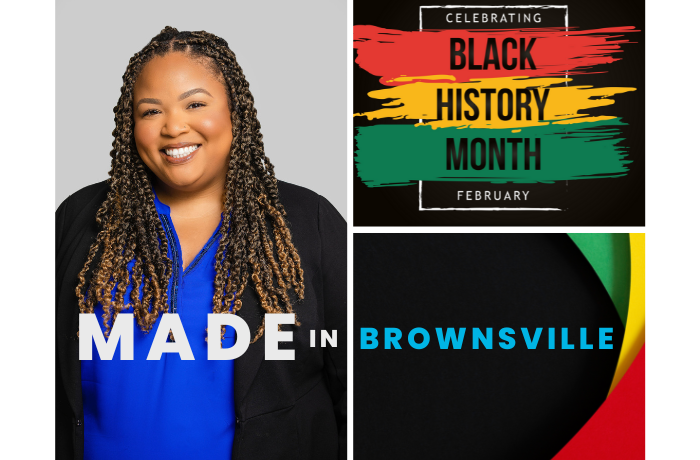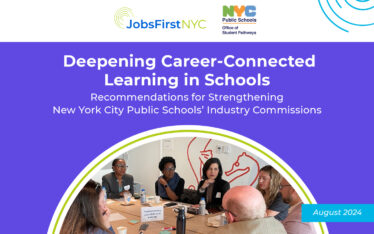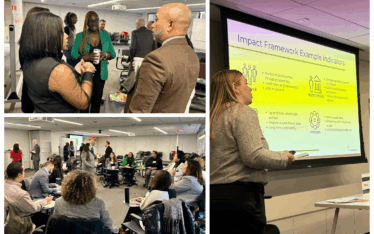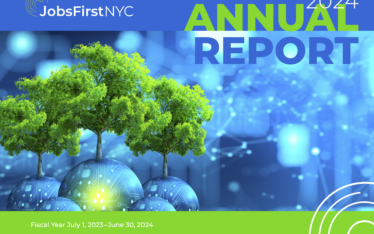JobsFirstNYC’s commitment to supporting community partners has paved the way for powerful collaborations with results-driven organizations like Robin Hood, and, in 2021, JobsFirstNYC was selected to be a Brownsville anchor partner for Robin Hood’s Mobility LABs initiative. Mobility Learning and Action Bets – Mobility LABs – is a pioneering, four-year initiative to spur the development of new solutions to sustainably lift families out of poverty, and to promote dynamic leaders who will aim to change the national conversation around social and economic mobility.
Brownsville is where we first connected with Lori Boozer, Director of Mobility LABs at Robin Hood. In celebration of Black History Month and as a tribute to her leadership and public service career, JobsFirstNYC sat down for a refreshing interview with Lori to reflect on growing up in Brownsville, her inspiration, how this storied town is creating its own equity-based path to self-sufficiency and what Black History Month means to her.
Brownsville is a historic and storied Black neighborhood in Brooklyn. Tell us about the Brownsville that you grew up in.
I remember fondly the sound of Shabba Ranks singing “ting a ling a ling” and my 7-year-old self singing loudly to the tune of “I’m in love with a man nearly twice my age,” and dancing to Biz Markie while I waited impatiently for my great aunt to take me downstairs to family day. There were giant speakers posted up on the blue makeshift wooden stage in front of my building, Langston Hughes Houses. My great aunt who was an active member of the tenant’s association and several of the “aunties” would bake cakes and pies, and Ronald Taylor who was president of our tenant’s association would hand out shirts emblazoned with our Langston Hughes Houses on the front – a show of solidarity amongst the residents. All of us kids would run to the stage to see our peers dance in sparkly outfits. And typically a performance would start out in another housing development since family days fell on the same day, and you would see a parade of supporters for the performers march from development to development to see their building’s performers represent with pride.
The special type of energy that exists in Brownsville can be hard to put into words. However if there was one word that could capture that energy, it would have to be resilience. That is the essence of it. An energy that says no matter how many times we fall, how many naysayers we have, how much we as a community may feel neglected, we can and will keep going. And there was always a real sense of family, knowing your neighbors intergenerationally. I saw that depth growing up – young, old and everyone in between bonded by the fabric of what the community lacked: a sense of safety, resources, investment in our futures; and what it had in abundance: fearlessness, resolve, connectivity. You can visit the Brownsville Heritage House at the Stone Avenue Library and perhaps see a glimpse into the heart of Brownsville.
What is Brownsville’s secret ingredient for birthing so many prolific leaders in almost every field like Eric Adams, Larry King, Willie Randolph, RZA, and Al Sharpton?
The secret ingredient is the Never Ran, Never Will mentality. The belief that nothing is too big to conquer. That no fight is too great to be fought. And it reflects the great depths of talent that reside in the community, people known and unknown. Great leaders and creators reside in Brownsville. The challenge is ensuring that everyone has an opportunity to realize their own potential.
Who and what sparked your interest in transforming the lives of young people?
As a young person growing up, I had a lot of love and support from educators in the community. I fondly remember Head Start and elementary school. My teachers made me feel special and limitless. They encouraged me to embrace my intelligence which helped me find purpose – that I was someone who could impact the world around me. But it was not until I attended Vassar College that I realized the stark differences between the world I grew up in versus the world of privilege. Going to an Urban Education class and reading about my own community in textbooks woke me up. I understood my own poverty, in that my family received food stamps and benefits, and that there was something more in the world that I was supposed to transcend to become. But it was college that gave me the tools and language to understand race and class beyond my own experience. I wanted to know how Brownsville became Brownsville, and with that how every young person could feel limitless regardless of their economic circumstances.
As a Director at Robin Hood you have an opportunity to develop and oversee the development of Mobility LABs. Why was it important for you to bring your talent back to Brownsville?
Aside from my family, I attribute my grit and ambition to growing up in Brownsville. Where you come from is so much a part of who you are no matter where you go, unless you deliberately choose to forget. When my Great Aunt took me to community meetings with her, I understood that service to others was important and believing in something or using your time and talent for something other than yourself was important so it was important to me to be of service to a place where so many served me growing up. I also believe exceptionalism is dangerous for communities like Brownsville – the labeling of the few who succeed by society’s standards as the standard and that everyone else lacks potential or is somehow lazy. Truthfully, we all have potential. We all have dreams and it feels amazing when you have room to show up in your life and achieve those dreams.One of the key features of Mobility LABs is the idea that the people who are closest to the challenge are also closest to the solution. Mobility LABs asks local anchor partners to use a data-driven, heart-led process to identify solutions and produce a plan to pilot, test, and implement those solutions.
❝One of the key features of Mobility LABs is the idea that the people who are closest to the challenge are also closest to the solution. Mobility LABs asks local anchor partners to use a data-driven, heart-led process to identify solutions and produce a plan to pilot, test, and implement those solutions.❞
That’s a tall order, what kind of success are you having?
That is a very tall order and Robin Hood went into this knowing that we were taking a risk and the results would vary, but I think it was important even if only from a narrative-shifting perspective, to demonstrate the impact of what it is for the community to lead the way. So much of this work is about dictating to people what we think they should do. So what happens when we reverse that? When a community has been so marginalized what does it mean to that community to have some of the power in decision making? What I am seeing is an increase in feelings of power and autonomy which is a part of the Mobility LABs framework. I am seeing pride in ownership, particularly in communities like Brownsville. I am also seeing the challenge of taking a very large pie and trying to find the right slice to focus on, knowing that time and funding is limited. It is not a perfect process, but what I hope we find at the end is a strongerco-creation model, a greater interest in the holistic development of community, and, with that, the increases in employment, access to education, and other markers of success that we are also seeing being more sustainable because the community was deeply invested in its own process.
❝What I am seeing is an increase in feelings of power and autonomy which is a part of the Mobility L.A.B.s framework. I see the pride in ownership, particularly in communities like Brownsville.❞
What have you learned in your professional life that you think every young person needs to succeed?
The number one thing I have learned in my professional life is the power and importance of having a growth mindset. For every area of life and with every issue – the things I am good at doing and the things I struggle with – having a growth mindset is what keeps me focused and helps me to move past adversity. It also keeps me from being complacent when I think I have something figured out or that I have arrived. This mindset allows me to engage with myself and others with compassion and empathy. I’ll also add to this something that is hard for me to keep on top of and that I learned later in life after buying into the belief that working hard gets you to the top, and that is the power of your personal network and building relationships. This is critical because Black people have been sold and bought into the myth of meritocracy, that hard work alone will get you ahead. When others are enjoying the privilege of nepotism and connection to open doors, we are singularly working hard to fight stereotypes of laziness, affirmative action, and implicit/unconscious bias. We should continue to work hard and be excellent AND invest in your relationships with people who will invest in your success, sponsor you and help you move forward. And lastly, be PREPARED to seize the moment when luck crosses your path.
You have worked across multiple agencies like the Urban Resource Institute, the New York City Human Resources Administration, and now Robin Hood. What inspires you to continue advocacy, and, at this point in your career, what would you say is the key to breaking intergenerational poverty?
Well, this is a big question! I think advocacy is just a part of my nature and will always be regardless of where I work or what I do. I have a very strong sense of justice and fairness that manifests in my work. Now for the breaking the cycle of intergenerational poverty – I am running out words in this blog piece to give a full answer but in short, I suggest some universe of the following:
- Prioritize health and mental health for communities of color because our health is intergenerational too and significantly impacts overall life outcomes.
- Identify and deliberately address the broken narratives that still drive how we form policies and that underpin existing systems so future generations have a different outcome.
- Do the individual work of self discovery (every one of us) to understand the role we play in maintaining systems of oppressions – no matter how much discomfort we feel and no matter what race we identify as. We affirm or disaffirm these systems in our daily choices.
- Invest in getting and keeping people on their feet and continue to invest in their potential. A job is a paycheck away from broke. Listen to who a person wants to be and partner to support that person’s journey.
- Address community trauma and healing, and include intergenerational and intercultural healing as part of that process.
With the heated debate around Critical Race Theory, why is it important to tell the Black story to America and to the rest of the world?
It is important to tell the Black story because whenever you omit portions of true history you are likely to repeat the errors of the past. It is also a story of great accomplishment, joy and vibrancy, and so telling the entire story – not just the story of struggle – is important. It is important for others to know and understand who we are and that anti-Black sentiment is real and why it exists. It is also important for Black people to know of the power from which we come, to be reminded of it, to step into it and own it, and to also own that triumph and joy are as much a part of our narrative as adversity is.
I am optimistic about Brownsville because:
The Brownsville HUB Cooperative is a demonstration of what can happen when a community leads the way, is supported in building infrastructure, and develops the means to attract and retain programming and further investment. Brooklyn Borough President Antonio Reynoso’s interest in investing in the business and economic development of Brownsville is but one of several testaments to the HUBs success. The narrative of if you build it, they will come, no matter the challenges a community has faced in its past, rings true.
JobsFirstNYC Note: The Brownsville Hub Cooperative was developed to ensure that community residents were the direct benefactors to economic development investments made in the Brownsville community





